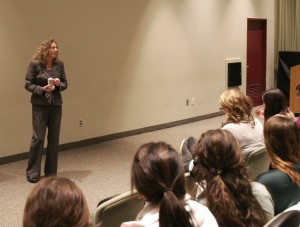
Associate Dean of Students Anne-Marie Algier explained the potential bar party policy changes to student groups on Tuesday, Nov. 1. Drue Sokol, Photo Editor.
The fate of bar nights is currently up in the air, according to Dean of Students Matthew Burns.
Due to an increasing number of reckless and often unsafe incidents that began cropping up as early as the previous academic year, students and faculty have begun discussing what needs to be done to prevent these altercations.
“What I can’t do, given the information I have, is nothing,” Burns said.
This is not the first time he has had to amend these policies. In 2008 a number of physical altercations were reported — as was vomiting on buses, pregaming before events and the rushing of buses — but the tipping point came when one incident involved a knife. Following this altercation, Burns instated a moratorium on bar buses to develop safer procedures.
The Bar Night Review Committee, made up of staff and students, was formed as a result, as were the current policies. Currently, bar nights are classified as either unrestricted or restricted.
Unrestricted events are open to the “general population,” whereas restricted bar nights are closed to the general population and are limited to fewer than 300 attendees.
Both types of bar nights have age, security and transportation requirements. Additionally, requests for events must be made to the Office of the Dean of Students at least two weeks before they are set to take place.
These new policies appeared to work initially, but as of late the same problems experienced in 2008 have been cropping up again. They began to trickle in last year, but have become significantly more common this semester.
“Reports lately are getting really bad,” Associate Dean of Students Anne-Marie Algier, who chairs what is now referred to as the Bar Bus Committee, said at a meeting explaining the situation to some of the leaders of organizations which host bar nights.
There have been incidents of vandalism and physical altercations. Many students have been sent to the hospital due to intoxication, and the buses are becoming overcrowded. According to Burns, these incidents are occurring on a weekly basis.
Burns referred specifically to an occurrence when a student broke a window on the bus after the driver did not let him in and had closed the door since the bus was already full. It is unclear as to why the student broke the window, but Burns guessed that it was “probably out of frustration or anger.”
Most of the incidents are occurring at restricted bar nights, which Algier said is “really disurbing.”
But what is causing this resurgence of dangerous incidents?
Senior Alissa Brill, a senator-at-large and SA representative on the Bar Bus Committee, thinks that some students might not understand the implications of their actions or do not control themselves due to their level of intoxication. She also hypothesized that the policies either do not target the right issues or are not being properly enforced.
“What we’re seeing now is it only takes a couple of years for institutional memory to fade,” she noted.
Drinking that occurs before students come to the buses has also been blamed as an instigator of these incidents.
The question now is what the next step will be.
“I can’t wait forever,” Burns said. “I’m not going to wait for some serious incident to happen on one of these buses.”
The Bar Bus Committee is currently contemplating policy changes for the coming semester, Brill explained. One of the proposals is to not allow the location of the party to be announced until 24 hours before the event. Even when it is revealed, only the people on the guest list will be informed. The hope is that this will prevent uninvited students from attempting to board the buses.
Algier admitted that people will inevitably find out about the location regardless of these efforts, but she expressed hope that the policy would eventually “seep into the culture” once the word started to spread.
There is also talk of providing groups with tools to make their events more successful, and Algier stressed that students should stick to their assigned buses to prevent overcrowding. These changes are set to be established in January when a lot of leadership positions shift.
“I don’t know what it’s going to take,” Burns said. “I’m open to suggestions, but I feel like I have limited choices here.”
If improvements do not occur, there is a chance that bar nights may be discontinued entirely. According to Algier, they could be in “serious jeopardy.”
“That’s out there as a possibility,” Burns said.
But avoiding this prospect is straightforward. “If this is something you enjoy, you need to behave,” Algier said.
Goldin is a member of
the class of 2013.


